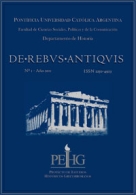Please use this identifier to cite or link to this item:
https://repositorio.uca.edu.ar/handle/123456789/6906| Título: | Cesare e la retorica greca | Autor: | Zecchini, Giuseppe | Palabras clave: | LITERATURA LATINA; RETORICA; Emporius | Fecha de publicación: | 2011 | Editorial: | Pontificia Universidad Católica Argentina. Facultad de Ciencias Sociales, Políticas y de la Comunicación. Departamento de Historia | Cita: | Zecchini, G. Cesare e la retorica greca [en línea]. De Rebus Antiquis. 2011, 1 Disponible en: https://repositorio.uca.edu.ar/handle/123456789/6906 | Resumen: | Resumen: El presente trabajo se analizará un pasaje del Praeceptum deliberativae materiae, un texto retórico escrito por Emporius en el siglo V/VI, en el cual César reclama ser un Graecae exercitationis expers; tal extraña definición tiene sus raíces en la controversia de los populares contra la helenización de la nobilitas: desde una perspectiva popularis el vir romanus real tenía que preferir las habilidades militares a las retóricas, como C. Mario había hecho, y tenía que adquirir sus habilidades retóricas en Latín, no en griego, como el Rhetorica ad Herennium exhortaba. Luego ser Graecae exercitationis expers pasó a ser una cualidad requerida para un líder de los populares, tal como César quería ser reconocido, y podemos remontar sus orígenes en la propaganda literaria del partido cesariano, sobre todo en el Bellum Iugurthinum de Salustio y en el Anticato del propio César. Abstract: This paper is going to analyze a passage of the Praeceptum deliberativae materiae, a rhetorical text written by Emporius in V/VI century A.D., where Caesar is claimed to be Graecae exercitationis expers; such a so strange definition has its roots in the controversy of the populares against the Hellenization of the nobilitas: from a popularis perspective the real vir Romanus had to prefer the military skill to the rhetorical one, as C.Marius had done, and had to acquire his rhetorical skill in Latin, non in Greek, as the Rhetorica ad Herennium advised. Then being Graecae exercitationis expers was a quality requested to a leader of the populares, as Caesar wanted to be recognized, and we can retrace its origin in the literary propaganda of the Caesarian party, above all in Sallust’s Bellum Iugurthinum and in the Anticato of Caesar himself. |
Cobertura Espacial: | SIGLO V SIGLO VI |
URI: | https://repositorio.uca.edu.ar/handle/123456789/6906 | ISSN: | 2250-4923 | Disciplina: | HISTORIA | Derechos: | Acceso Abierto | Fuente: | De Rebus Antiquis. 2011, 1 |
| Appears in Collections: | DRA - 2011 nro. 1 |
Files in This Item:
| File | Description | Size | Format | |
|---|---|---|---|---|
| cesare-retorica-greca-zecchini.pdf | 208,96 kB | Adobe PDF |  View/Open |
Page view(s)
100
checked on Apr 30, 2024
Download(s)
218
checked on Apr 30, 2024
Google ScholarTM
Check
This item is licensed under a Creative Commons License

